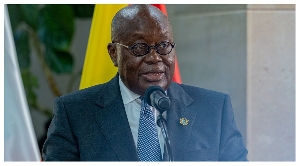Industrialization has been a key driver of economic growth for most advanced countries. This can be seen in the Industrial Revolution, which altered countries such as China, Germany, the United States of America, and Japan, to name a few.
Ghana has been aiming to transition its economy from relying on primary commodities to focusing more on industrialization by leveraging on its rich natural resources, including gold, diamonds, bauxite, fertile land, and oil.
The “One District, One Factory (1D1F) initiative, launched under the administration and tenure of President Akufo-Addo, sought to propel the country into a more industrialized economy by establishing a factory in each of the 261 districts. The project, initiated in 2017, aimed to shift Ghana’s economy from relying on importing and exporting raw materials to emphasizing manufacturing, adding value, and exporting processed goods.
However, there have been several divergent views about this initiative. Proponents have described it as a game changer that has yielded economic diversification and employment growth.
In a Facebook post by the president, after a visit to Blue Skies Industries, he was quoted as saying, “My government has overseen the development of a total of 321 1D1F projects, consisting of 211 new medium- to large-scale enterprises and the conscious enabling of 110 existing enterprises.”
These include companies in the pharmaceutical sector, recycling sector, wood and wood products sector, automobile sector, agro-processing sector, and food and beverage sector, among others. According to an article by Laud Nartey published on May 8, 2024, on the 3News website, it is reported that the initiative has created around 170,000 direct and indirect jobs.
Even though President Nana Addo was referenced in the report, it disputes an earlier estimate that he made on January 4, 2024, claiming that 160,000 Ghanaians already had jobs because of the 1D1F. Furthermore, according to Nana Akomea, a member of the ruling New Patriotic Party (NPP), “139,331 jobs have been created as of July 2020, comprising 18,811 direct jobs and 120,520 indirect jobs.”
Despite government assertions that the 1D1F program will create jobs, inconsistent employment figures from various officials highlight the inefficiencies and lack of transparency that are common in state-led enterprises, reinforcing libertarian skepticism about the government’s role in economic affairs.
Skeptics have raised doubts about its effectiveness, highlighting concerns about implementation challenges, long-term sustainability, and profitability. Some also believe most of the projects under this initiative are just “white elephants.” This is because there have been several reports by some media agencies, such as “The Fourth Estate,” citing some of the factories as not
operational, some employing less or can’t find raw materials, or facing financial challenges.
Here are some of the factories listed in their reportage: Akontombra Rice Factory, Feanza Industries, Birim Oil Mills, and Fiase Oil Palm Processing Factory, among others.
Cynthia Essandoh’s article on Ghana News Online, dated March 24, highlights concerns over the surge in tax exemptions under the 1D1F initiative, which has caused substantial revenue losses. Member of Parliament for Asawase, Hon. Mubarak Mohammed Muntaka, expressed concern over the widespread exploitation of the opportunity. However, majority leader Hon. Alexander Afenyo-Markin defended the initiative, stating that tax waivers are intended to stimulate economic growth rather than incur losses for the state.
One significant challenge of this initiative is the lack of a mature and strong legal and regulatory framework for Public-Private Partnerships (PPP) in Ghana. This weak framework has created opportunities for corrupt practices within the 1D1F program, particularly due to the use of unsolicited PPP proposals. These proposals often bypass competitive tendering processes, leading to concerns about transparency and accountability.
Moreover, the political climate in Ghana, where opposition parties often view contracts made by the incumbent government as questionable, further undermines investor confidence. This political tension, combined with insufficient skilled personnel in public institutions to manage complex PPP arrangements, exacerbates the risk of corruption and mismanagement.
There are also operational challenges, including financing, access to raw materials, and market access, which hinder the potential of companies operating at full capacity. Addressing these issues is crucial for the sustainability of the program. Also, the lack of an enabling environment, such as proper infrastructure (roads, technology, etc.), availability of raw materials, and support services, hinders the growth of these businesses. Additionally, policy discord among government agencies also creates confusion and delays in decision-making, further impeding the progress of the initiative.
Addressing these challenges will be crucial to ensuring the long-term success and sustainability of the 1D1F program.
In addressing these issues and improving the 1D1F initiative, several steps can be taken:
Public-Private Partnerships: This can be achieved by encouraging more Public-Private Partnerships (PPPs) to leverage private sector expertise, efficiency, and capital. This approach can help mitigate the financial burden on the government while accelerating the pace of industrialization. PPP should be based on merit and competence and must avoid cronyism.
Enhance Transparency and Competition: Implementing a more competitive
and transparent bidding process for PPP projects would improve public trust and
ensure better value for money. This includes conducting thorough feasibility
studies and inviting investors to bid for projects under a well-regulated and
transparent process.
Increased Access to Capital: Improving access to affordable financing for both new and existing factories can help. This can be achieved through partnerships with financial institutions, offering low-interest loans, and providing grants to start-ups and SMEs.
Infrastructure Development: Invest in critical infrastructure such as roads, electricity, water supply, and communication networks. Better infrastructure will reduce operational costs and attract more investors to underdeveloped districts.
The 1D1F program requires robust monitoring and evaluation mechanisms to track progress and impact. Regular assessments and feedback loops help identify bottlenecks early, allowing for adjustments. Engaging with local communities and fostering a collaborative approach fosters ownership and pride, leading to long-term success and impact. This approach ensures sustainable and beneficial projects for all stakeholders.
In conclusion, evaluating these factories’ profitability and meaningful contribution to the economy will be essential in determining the overall success of the 1D1F initiative. Whether these factories can operate profitably and contribute meaningfully to the economy remains to be seen.
Opinions of Wednesday, 7 August 2024
Columnist: Richard Nyarko



















